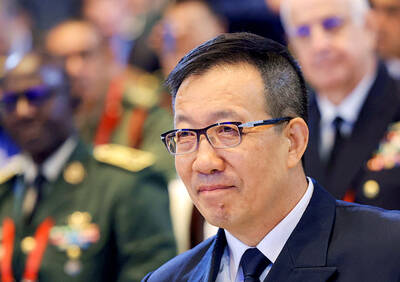Thousands of firefighters, including army troops, battled hundreds of forest fires that raged across central Russia in the worst heatwave for decades, destroying houses and killing more than 30 people.
More than 2,000 troops have been sent in to help firefighters, a defense ministry spokeswoman told ITAR-TASS news agency yesterday.
A total of more than 16,000 firefighters are battling the flames, along with 56 helicopters and planes, the emergency ministry said yesterday.
Four hundred fires were still burning over more than 120,000 hectares yesterday morning, while 387 fires had been extinguished in the last day, the ministry said in a statement.
In the Nizhny Novgorod region, one of the worst hit, firefighters struggled to quench flames amid strong winds, with 11 separate fires still burning yesterday, the ministry said.
Russian Prime Minister Vladimir Putin on Friday visited the village of Verkhnyaya Vereya in the region where more than 300 houses were destroyed by the fires, leaving more than 500 people homeless, and was confronted by tearful residents.
“By winter, all the houses will be standing. I promise you that your village will be restored,” Putin pledged, as residents circled round him in a televised encounter.
He also promised to give each person 200,000 rubles (US$6,614) in compensation for their lost possessions.
Putin allocated 5 billion rubles to rebuild houses and said he would personally control the process, his spokesman Dmitry Peskov told Russian news agencies on Friday.
Three bodies were found yesterday in burnt-out houses in the district visited by Putin, the regional emergency ministry told the Interfax news agency, raising the toll from nine to 12.
Officials had reported deaths of 29 people in fires on Friday, although the emergency ministry did not give a toll for the whole of central Russia.
The defense ministry allocated 550 troops, including a tank regiment, to help the firefighting in the region, the emergency ministry said.
Temperatures of around 40 degrees Celsius were reached in the Voronezh region yesterday, where more than 500 people have been left homeless by fires raging in the suburbs of the regional capital and television reports showed the city shrouded in smoke.
A television report showed residents returning to scrape through the ashes of their burnt-out homes, with some carrying out jars of pickles that survived the flames in cellars.
A record-breaking heatwave has seen the agriculture ministry declare emergency situations in 23 regions, with crops blighted by drought on around 10 million hectares of farming land.
In Moscow, smoke from smoldering peat and forest fires swathed skyscrapers with smog this week and Thursday saw temperatures hit 38.2 degrees Celsius, the hottest recorded in the city since records began.
As people cool off by taking dips in lakes and rivers, many of them without life-saving equipment, Russia has also seen a high death toll from drownings. Thirty-five people drowned on Friday alone, the emergency ministry said.

DEADLOCK: Putin has vowed to continue fighting unless Ukraine cedes more land, while talks have been paused with no immediate results expected, the Kremlin said Russia on Friday said that peace talks with Kyiv were on “pause” as Ukrainian President Volodymyr Zelenskiy warned that Russian President Vladimir Putin still wanted to capture the whole of Ukraine. Meanwhile, US President Donald Trump said that he was running out of patience with Putin, and the NATO alliance said it would bolster its eastern front after Russian drones were shot down in Polish airspace this week. The latest blow to faltering diplomacy came as Russia’s army staged major military drills with its key ally Belarus. Despite Trump forcing the warring sides to hold direct talks and hosting Putin in Alaska, there

North Korea has executed people for watching or distributing foreign television shows, including popular South Korean dramas, as part of an intensifying crackdown on personal freedoms, a UN human rights report said on Friday. Surveillance has grown more pervasive since 2014 with the help of new technologies, while punishments have become harsher — including the introduction of the death penalty for offences such as sharing foreign TV dramas, the report said. The curbs make North Korea the most restrictive country in the world, said the 14-page UN report, which was based on interviews with more than 300 witnesses and victims who had

COMFORT WOMEN CLASH: Japan has strongly rejected South Korean court rulings ordering the government to provide reparations to Korean victims of sexual slavery The Japanese government yesterday defended its stance on wartime sexual slavery and described South Korean court rulings ordering Japanese compensation as violations of international law, after UN investigators criticized Tokyo for failing to ensure truth-finding and reparations for the victims. In its own response to UN human rights rapporteurs, South Korea called on Japan to “squarely face up to our painful history” and cited how Tokyo’s refusal to comply with court orders have denied the victims payment. The statements underscored how the two Asian US allies still hold key differences on the issue, even as they pause their on-and-off disputes over historical

BEIJING FORUM: ‘So-called freedom of navigation advocated by certain countries outside the region challenges the norms of international relations,’ the minister said Chinese Minister of National Defense Dong Jun (董軍) yesterday denounced “hegemonic logic and acts of bullying” during remarks at a Beijing forum that were full of thinly veiled references to the US. Organizers said that about 1,800 representatives from 100 countries, including political, military and academic leaders, were in Beijing for the Xiangshan Forum. The three-day event comes as China presents itself as a mediator of fraught global issues including the wars in Ukraine and Gaza. Addressing attendees at the opening ceremony, Dong warned of “new threats and challenges” now facing world peace. “While the themes of the times — peace and development —